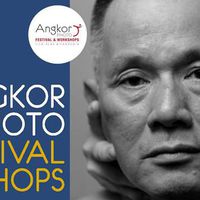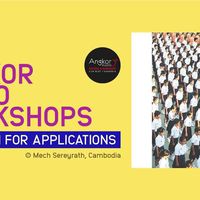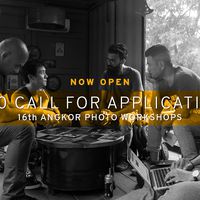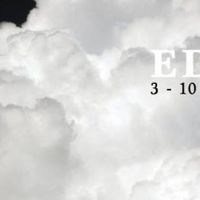In conversation at the Angkor Photo Festival | Cambodia

This year, culture360.org officially supported the7th Edition of the Angkor Photo Festival (APF) in Siem Reap, Cambodia that took place on 19-26 November. The APF is one of the major platforms of visibility for young contemporary photographers in Asia. In the framework of the festival, culture360.org and APF are co-producing the series “Visual Perspectives”, a photographic dialogue between Asian and European photographers.
So far, the concept of the Angkor Photo Festival has been to avoid a themed programme as a way of discovering – or rediscovering – artists from all over the world. Consistent with the festival’s mission of highlighting emerging Asian photographers, 70 of the 110 photographers exhibiting in 2011 were from Asia.
According to the Chinese curator, Wang Xi, the festival is a “great platform for exchange and dialogue between photographers; it is not only a great space to show your work but also a place to meet”.
The festival consists of a number of curated slideshows, one opening of a solo or group photo exhibition every day in a different venue and two different types of workshops, one for young emerging photographers from Asia selected through an open call, the other one for the children of Siem Reap, organized by the non-profit organization Anjali’s House.
The structure and the format of the Festival allow it to develop through different types of exhibitions, showcases and workshops in several interesting venues throughout Siem Reap.
While attending the event, the culture360.org coordinator Valentina Riccardi, exchanged some views with Jessica Lim, about past and future directions of the Festival.
After 7 years of running APF, how much do you think has changed?
The festival has certainly changed a lot since its beginnings. The organisation, structure and programme have been refined over the years to better suit our mission and our goal. Our emphasis now is to continue to create a festival that is open and welcoming to all, to push it as a meeting point for forming life-long friendships and creative partnerships, and also to serve as a platform to highlight Asian photographers.
What is in your opinion the most important achievement(s) of the Festival so far?
I think each of the festival's three main activities have accomplished different kinds of achievements. The festival itself has certainly been a place to discover and rediscover talent from all around the world, and especially Asia.
The Angkor Photo Workshops have been key in discovering a lot of emerging Asian photographers - many of whom are now showing work at the festival itself (going through the open call submission process). Also, a lot of these participants form amazing friendships with each other, and this connection is essential to forming strong networks of very high creative energy. They bounce ideas off each other, plan projects together, and help each other to develop in many ways.
Finally, the Anjali Photo Workshops which we have for the children of Anjali House has resulted in a 250-page photo book which we published last year, featuring photos from the 2008 and 2009 workshops. I think the main achievements of the workshops is the joy and fun it gives to the children, who greatly enjoy themselves, and also the sense of pride and confidence that they have in having accomplished something creatively.
Can you tell me more about blow-up Angkor?
Blowup Angkor was initiated by the Blindboys - an online collective from India. They had previously staged Blowups in several cities, such as in Paris, Newcastle, Bangalore, Delhi and Mumbai, and wanted to bring it to the festival in 2010. It was a great success last year, and we decided to bring it back again.
Blowup Angkor allows us to make a connection between the festival, photography, and the local people/community and environment. Photographers from all over the world contribute their work for free to be a part of Blowup - the photos are then printed out and pasted up on walls. All the venues for Blowup Angkor are public and in the streets - we work to find places that are frequented by the local community. The beauty of Blowup is being able to bring photography into a different space, and allow the images to communicate with a new audience in a new way.
The photos are not taken down -- we leave them up, and in fact, after a few days, most of the images have been taken home by people! We do encourage this, in fact, as it is another way of sharing photography.
How do you see the local community getting involved in the Festival?
All our events are free of charge, do not require any registration, and are completely open to the public and local community. More specifically though, Blowup Angkor is one initiative that reaches out to the local community, and we also had street photography on Children's Day -- when we had three young adults from Anjali House take portraits of people on the streets, which we then printed out on mobile Canon printers and gave their photos to them. We wanted Cambodians to be the photographers, as they would be able to better interact and communicate with the people on the streets to explain to them what they were doing. Based on how successful it was this year, we will definitely be expanding this further next year to do it in more locations and on more of the days!
What is the plan for next year edition? Anything new in terms of format or content?
It is a bit too early to say if there will be any changes in format or content -- there will certainly be new photographers and new work! We would want to continue to work on the projects that already exist so as to improve them. We will be getting feedback from the photographers too, to ask for comments and suggestions about things that can be improved upon. However, we are quite clear that we want to maintain the cosy, friendly atmosphere of the festival.
Jessica Lim is the Asia Coordinator of the Angkor Photo Festival.
http://www.angkor-photo.com/
http://angkorphotofestival.wordpress.com/
Similar content
deadline
15 Jun 2011
deadline
30 Jun 2015
from - to
03 Dec 2017 - 12 Dec 2017
deadline
30 Jun 2019
deadline
22 Jul 2020
from - to
03 Dec 2016 - 10 Dec 2016






